Choosing the Best Generators for RV Camping
If you go camping as often as some of us, and we certainly hope that you do, then you’ve probably experienced power fluctuation at your campsite. One minute the lights are bright and the air conditioner is on full blast; next thing you know there’s no water or air conditioning because it must have gone out while you were busy with something else. We can bet that this kind of situation drives people nuts who don’t camp, but for RVers, it’s a natural occurrence because most campgrounds come with electrical hook-ups: not only will the power go out once in a while but sometimes it might be fine for one hour before going out on another occasion.
All about RV Generator
- RV generators explained
So let’s say you have a big nice generator, but when the power goes out and your RV isn’t equipped with a generator, what can you do? You can forget about those appliances that require electricity like air-conditioners because they aren’t going to work; however, other devices like lights and fans do. This is why most campgrounds supply electricity to the campsites: for things like this. So having an RV generator would otherwise be useless if your site didn’t provide it in the first place.
- Generators versus Inverters
Today’s economy is demanding, so people are looking for ways to save money, especially when it comes to their homes, which is why generators vs inverters are being debated these days. The terms may sound confusing but choosing either one is not such a hard task. Inverters are known for their ability to convert 12-volt DC power into 120-volt AC and inverter generators are just regular generators that come equipped with an inbuilt inverter system. But whatever you do, the most important thing is to make sure that your RV generator can work with your appliances because this will eliminate any problems when it comes time for connecting them.
- How loud are they?
Noise level really depends on the user’s experience but generally speaking, you can expect both permanent and portable models to be quieter than conventional units. When it comes to size, these things usually depend on the fuel type (gas vs diesel), but the biggest ones are the loudest if we’re talking about conventional units. Portable models come with wheels attached to their frames and this allows them to be moved around wherever you like and when it comes time to stop using them, they can be simply removed from the place.
- Power Generators for RV
Finding the best way to produce electricity that’s why power generators for RV have become popular today. If you have a small tent, then a mini generator is perfect for you, but choosing a big generator will do just fine if you have an RV or camper. The kind of power generators that we need on our RVs depends on what we need it most it usually refers to fuel consumption, weight, noise level, and mobility. So let us take a look at some things that will really help us choose the best power generator for our needs.
Best Inverter Generator for RV
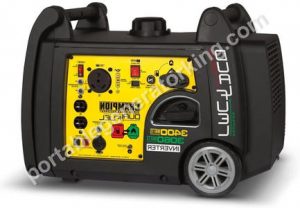
Portable power at its best. The Champion 3400-Watt Dual Fuel Portable Generator features noise level 59 dBA, perfect for your next project or backup power for your home. Access all of the controls on the Quick Touch Panel and with a battery included, this generator is powered by either gasoline or propane gas. With up to 7.5 hours of run time on a tank, this portable powerhouse will not disappoint!
| Wattage | Product Dimensions | Frequency |
| 3400 watts | 25.1 x 17.3 x 18.3 inches; 95.7 Pounds | 60 Hz |
Inverter generators can be quite expensive to purchase and maintain, but they do have their benefits. Unlike conventional generators, inverters are smaller in size and when it comes time to move them around or store them, you can simply detach the corded device because it isn’t even attached to an external frame; this means that the engine sits on the ground without any suspension. They also come with soft-start technology which makes them run more quietly than other models but they are way more sensitive at high throttle. Plus, they’re not as loud as most portable propane RV generators out there (which is what we’ll discuss later).
Best Portable Dual Fuel RV Generator
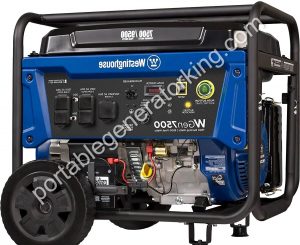
This is the perfect generator for anyone who wants convenience and reliability. Whether you want power in your home, on the job site, or tailgating before a big game –Westinghouse generators have you covered! Go with Westinghouse’s 7500 Running Watts and 9500 Peak Watts WGen7500DF running at 2750 RPM to provide up to 11 hours run time per fill with our 6.6-gallon fuel tank (Or 20 hours when used with 8 gallons of fuel). This generator also features two GFCI outlets and one L14-30R 120/240V twist-lock receptacle for all of your demanding needs including plug-and-play functionality–comes fully pre broke down assembled right out of the box! And with its wheel kit included, the WGen7500DF is easy to transport and store in your garage when not in use.
| Wattage | Product Dimensions | Engine Type |
| 7500 watts | 27.2 x 26.1 x 26 inches; 192 Pounds | 4 Stroke |
Portable Dual Fuel RV Generator is one of the most popular generators for RV because it can run using gasoline and propane fuel. You would have no trouble choosing a portable dual generator for your RV because they are affordable, lightweight, durable, and easy to get started when you want to use them. They come in different sizes and shapes but whatever size or shape is chosen, they all give out about the same amount of power.
As long as you’re with your family during a camping trip, there should be no problem finding a space where you can park your van or trailer so that you will have room to move freely with all your stuff inside; however if this isn’t the case, then having one of these items on board may prove useful at times when a plug-in is out of reach. Portable generators are not only good for camping, but they’re also great to have when you want something powerful enough to run your home appliances such as lights, TVs, refrigerators, and fans while waiting on the power company to arrive.
Best Portable Gas RV Generator
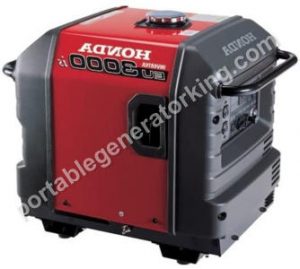
Quiet, affordable and fuel-friendly, this 3000-watt generator can keep you charged for hours. With the power to spare- the EU3000is offers 7.2 to 20 hours of runtime at a cost as low as $0.28 per kWh at typical usage levels and one tank of gas – it serves any application where quiet operation is important
Fun facts: Lighter than most in its class; starts with the touch of a button thanks to Honda’s Electronic Carbsure Start (ECS); includes our exclusive eco-throttle function that emits less noise and saves on fuel; features our unique inverter technology; comes equipped with oil alert to remind you when it’s time for an oil change.
| Wattage | Product Dimensions | Tank Volume |
| 2800 watts | 26 x 22 x 17.6 inches; 144 Pounds | 3.4 Gallons |
Portable Gas RV Generator is one of the best RV generators that you can find because it is lightweight, strong, and very easy to start using. It does not have any complicated installation process and running it doesn’t require some kind of license because anybody can do it.
RVs are intended to be moved from place to place for people to enjoy their holiday or vacation time with their families or friends while exploring the new places they’ve never been before but this won’t ever happen if you don’t have a good portable generator inside your car; therefore having this item onboard will eliminate any problems when it comes time for using electrical appliances during camping trips.
Best Diesel RV Generator
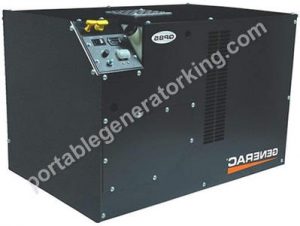
Low rpm speed control: Generac’s patented low rpm design, which uses a large displacement engine to produce greater torque instead of high RPMs. This gives you the flexibility to run at lower speeds while generating more power. Since it’s less noisy and has smoother performance than competitive variable-speed RV generators, this generator meets your needs for clean sound and performance – even with lights plugged in.
Innovative design: We’ll never stop innovating or testing our products on new materials, shapes and construction methods until we reach the ultimate goal – better product durability and customer satisfaction. Performance is everything, so rigorous testing helps us stay ahead of the competition by reducing failures under all conditions out there on today’s market so you can choose Generac for your next generator for camping.
| Wattage | Product Dimensions | Engine Type |
| 8500 watts | 26 x 25 x 40 inches; 520 Pounds | 4 Stroke |
Diesel RV Generator makes the top-of-the-line generator because it can house a lot of power and even take in more electrical current without any problems. They produce noisier sounds compared to other generators, but they are way more capable of running sophisticated electrical equipment for you and your family.
Best Propane RV Generator
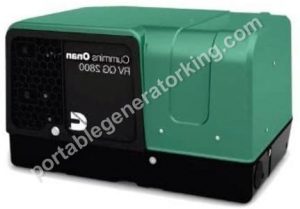
What if you need a generator, but the size and weight are important? Don’t worry! The Cummins Onan RV QG 2500 is here. Lightweight for easy installation and compact to handle any sized garage or storage space. Rugged enough for your next camping trip with plenty of power when the lights go out this lightweight generator can take care of all your portable power needs! At 2500 watts at 90 degrees it will run most campgrounds’ AC unit consumption on 110 volts. No hassles or extra worries- plugin this quietest generator set of their size, easy to maintain with single coupler service, fuel-efficient and get 3 years limited warranty as well.
| Wattage | Product Dimensions | Engine Type |
| 2500 watts | 38 x 25 x 26 inches; 135 Pounds | 4 Stroke |
Propane RV Generator is the most popular among a lot of RV lovers because it can run for hours without you having to worry about refilling it. It’s also very easy to start using; all you have to do is turn a key and as soon as they fire up, the generator will be ready to use within minutes.
Propane generators are only good for certain situations where you don’t need something that produces so much power; if this is not your case, then propane generators may not work well for you and your family. They’re also heavy but despite all these disadvantages, they come with an affordable price which makes them worth purchasing.
Best RV Generator With Electric Start
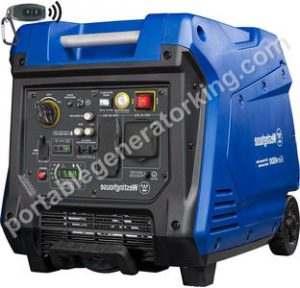
The Westinghouse iGen4500 inverter generator is a power-packed powerhouse that provides 3700 watts of reliable, clean and quiet electricity that can run all your essentials! With 68 decibels of noise output it’s so quiet you can use it indoors or right next to your neighbor. Durable enough for travel trailers and 5 different outlets, this 34 lbs machine guarantees tranquility wherever the job takes you.
| Wattage | Product Dimensions | Tank Volume |
| 4500 watts | 24.5 x 17.5 x 20 inches; 93 Pounds | 3.4 Gallons |
RV Generator With Electric Start can be very effective when it comes to providing enough power to run your electrical appliances during camping trips. Even though they can’t produce as much power compared to the ones we’ve mentioned above, they still have their own advantages which make them great for small-scale RV applications.
Their main advantage is that even those with some mechanical experience won’t have a hard time starting them up because most models come with an electric start engine; therefore non-experienced users will find operating these generators more convenient, especially during emergencies where all you want is having your campsite lit up and ready to use without any hassles. However, just like any other application or appliance out there, a lot of people who really love camping and venturing off into the deep woods for a few days never leave home without their generators.
Best RV Portable Generator Guide
There are lots of things to consider when it comes to choosing the best generator for your recreational vehicle, but the most important is how big it will be in terms of output and running time. If you plan on using this with just an air conditioner then choose a smaller one; however, if you plan on combining its use with other appliances then it’s highly recommended that you get something bigger. You should also check how efficient these products are before making your final choice because some models may eat up more fuel than others thus requiring a lot of money each time they’re refilled. Here’s what you need to know:
There are two kinds of RV generators which you can choose from; you can either go with portable ones or permanent ones. The first one is easy to transport, and it also offers a lot more power compared to the latter. If this is what you want then you should without any doubts get a portable generator however if you need something that doesn’t require maintenance and won’t be used just for outdoor activities then a permanent one will do just great. However, if your main goal is saving money on gas and electricity then getting an RV generator that’s permanently installed in your car will do wonders for your wallet because aside from being cheaper than portable models they don’t have additional engine costs as well fuel expenses. You’ll that purchasing a permanently installed RV generator is more expensive, but you can save thousands of dollars from electricity bills every year making it all worth it in the end.
One thing to consider when deciding how much a portable generator weighs is its size because even if they may look small some models are still bigger and heavier than others. It’s very important to consider this factor when purchasing one as carrying something heavy around won’t be comfortable due to inevitable fatigue after hours of use. If portability and weight aren’t that big concerns for you then you should make sure that the unit fits your RV’s electrical system so no time will be wasted on trying to figure out how things work with no success whatsoever.
An average-sized 100-watt light bulb will consume about 10-12 watts worth of energy per hour and if you use an auxiliary unit that’s in charge of the electrical system of your RV then it’ll be eating up roughly 20-25% of its overall energy. Motorhomes with two air conditioners installed are a must-have during summer camping since they can quickly drive up your monthly electricity bill so having an RV generator is literally a lifesaver! Therefore, even though portable generators don’t eat much gas when compared to their permanently installed counterparts you should still check how many gallons of fuel it needs to run for 5 hours to determine just how far this unit will take you; however, this number isn’t consistent because some models require more fuel others less and these units can be used with other RV appliances like water pumps.
If you plan on using your portable generator for just an air conditioner, toaster, or blender then a unit that produces around 3000 watts will be more than sufficient; however, if you want something bigger then make sure that it has big enough power output considering all the additional devices you’ll also use during camping trips. It’s highly recommended that you go for models which have 60 Hz frequency since this is the standard one for RVs but there are some generators out there that have 50 Hz frequency thus making them incompatible with older electrical systems so pay close attention to order to avoid any problems when doing some final tests before deciding if the model is going work.
The loudness of a generator’s motor depends on how much power it can deliver to your appliances and the size of the engine which you should definitely take into consideration before purchasing one. If you get annoyed by high levels of noise then you should avoid models with smaller engines since these tend to make more noise than their bigger counterparts. However, there are also portable generators out there that have double-walled enclosures thus decreasing their overall decibels; however, keep in mind that this feature usually comes at an increased cost so if you want something cheaper without losing any additional decibels then just look for optimized motors instead.
When you’re running your generator for the first time then make sure that you follow all manufacturer’s instructions to prevent potential issues from happening thus increasing its overall lifespan. For example, if you’re using a portable unit then this one must be installed above ground; however, it’s important to choose an appropriate spot otherwise flooding problems might occur which can damage many of its internal components.
Frequently Asked Questions
There may be many questions running through your mind when trying to decide whether to buy a permanent or portable generator but don’t worry, you’re not the only one! The following section will answer some of the most asked questions in this regard so have a look below and feel free to ask more if need be.